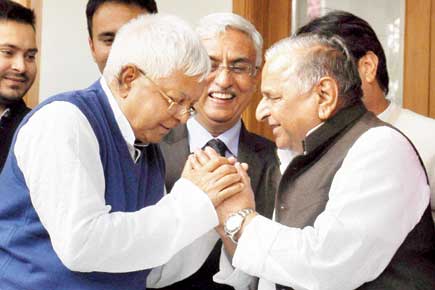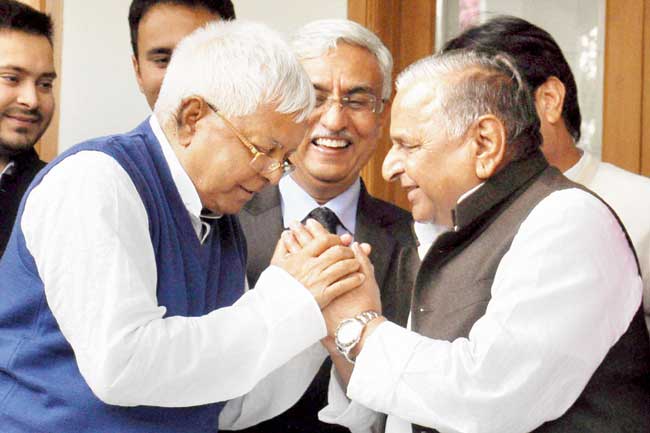The so-called Janata ‘Parivar’ comprising remnants of the old Janata Dal has been severely jolted in its first trial of strength although it has not yet been formally constituted

The so-called Janata ‘Parivar’ comprising remnants of the old Janata Dal has been severely jolted in its first trial of strength although it has not yet been formally constituted.
The dismal performance of the Rashtriya Janata Dal (RJD), the Janata Dal-United (JD-U) and the Congress (although the latter is only the parivar’s soul mate and not a member) suggests that the nascent alliance has a long way to go before it can be taken seriously.
ADVERTISEMENT

At a time when the voters are seemingly more enamoured of development-oriented programmes, the record of leaders such as Lalu Prasad Yadav and Mulayam Singh Yadav is one of the worst in the country
The formation, which has anointed Samajwadi Party’s Mulayam Singh Yadav as its leader, was apparently mooted after the satisfactory showing by the RJD-JD-U combine in the by-elections in Bihar in August and by the Samajwadi Party in Uttar Pradesh in September.
Their expectation was that a revival of the old Janata — mobilised this time against the Bharatiya Janata Party (BJP) and not the Congress — will enable the new outfit to put up a creditable show in the Hindi heartland. But the drubbing in Jharkhand could not but have poured cold water on these hopes. The reason for the setback is not far to seek.
From the outset, the group was seen as a gathering of tired provincials whose only incentive in coming together was the calculation that they will be able to put up a better fight against the BJP in the assembly elections in Bihar next year and in Uttar Pradesh in 2017 if they banded together instead of going alone.
However, considering that there was little love lost between them in the past — the RJD’s Lalu Prasad and the JD-U’s Nitish Kumar were once mortal enemies in Bihar while the fraternity of Yadavs was not enough to keep Lalu Prasad and Mulayam Singh together — their latest bonhomie merely underlined their unalloyed opportunism.
This is not their only disadvantage. At a time when the voters are seemingly more enamoured of development-oriented programmes, the record of leaders such as Lalu Prasad and Mulayam Singh is one of the worst in the country. The RJD leader is known to have run Bihar to the ground between 1990 and 2005.
Widespread lawlessness enabled Nitish Kumar, who was then with the BJP and described Lalu Prasad’s rule as ‘jungle raj’, to come to power in 2005 and again in 2010. The fact that they are now together is a sign of unprincipled conduct on both their parts.
Mulayam Singh, too, can hardly be regarded as someone with an economic vision in sync with the modern world. He may have moderated his dislike of the digital world under the influence of his foreign-educated son, Uttar Pradesh Chief Minister Akhilesh Yadav. But his observation that the party fared miserably in the last general election because the people were able to see and hear Narendra Modi on the laptops provided by the UP government showed that he retains his allergy towards computers.
Before coming to power in 2012, Akhilesh Yadav had admitted that his party had acquired a bad name because of its association with goons. But after a few initial attempts to control the hoodlums, he has done little to stamp out the menace, presumably because he is under the thumb of his domineering father and influential uncles.
Given the unpropitious background of the ‘parivar’ leaders and parties, only the foolhardy will see them as harbingers of a new dawn. There is another reason why they are at a disadvantage vis-à-vis Modi. While the latter favours a market economy, the Samajwadi Party, RJD and JD-U leaders, along with former prime minister HD Deve Gowda of the Janata Dal-Secular, are self-proclaimed socialists even if the somewhat vague doctrine is losing support among the younger generation and the middle-class.
Behind the preference for socialism is the belief that the implied official control of the economy will make it easier for the leaders to feather their own nests unlike in a competitive, open economy.
Not surprisingly, the Congress, which appears to be distancing itself from the reforms initiated by Manmohan Singh, is now an unstated natural ally of the Janata conglomerate. But after the Jharkhand debacle, the new assemblage is unlikely to inspire confidence among the BJP’s opponents.
Amulya Ganguli is a political analyst. The views expressed are personal. He can be reached at amulyaganguli@gmail.com
The views expressed in this column are the individual’s and don’t represent those of the paper.
 Subscribe today by clicking the link and stay updated with the latest news!" Click here!
Subscribe today by clicking the link and stay updated with the latest news!" Click here!







